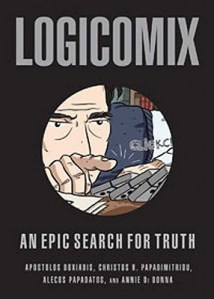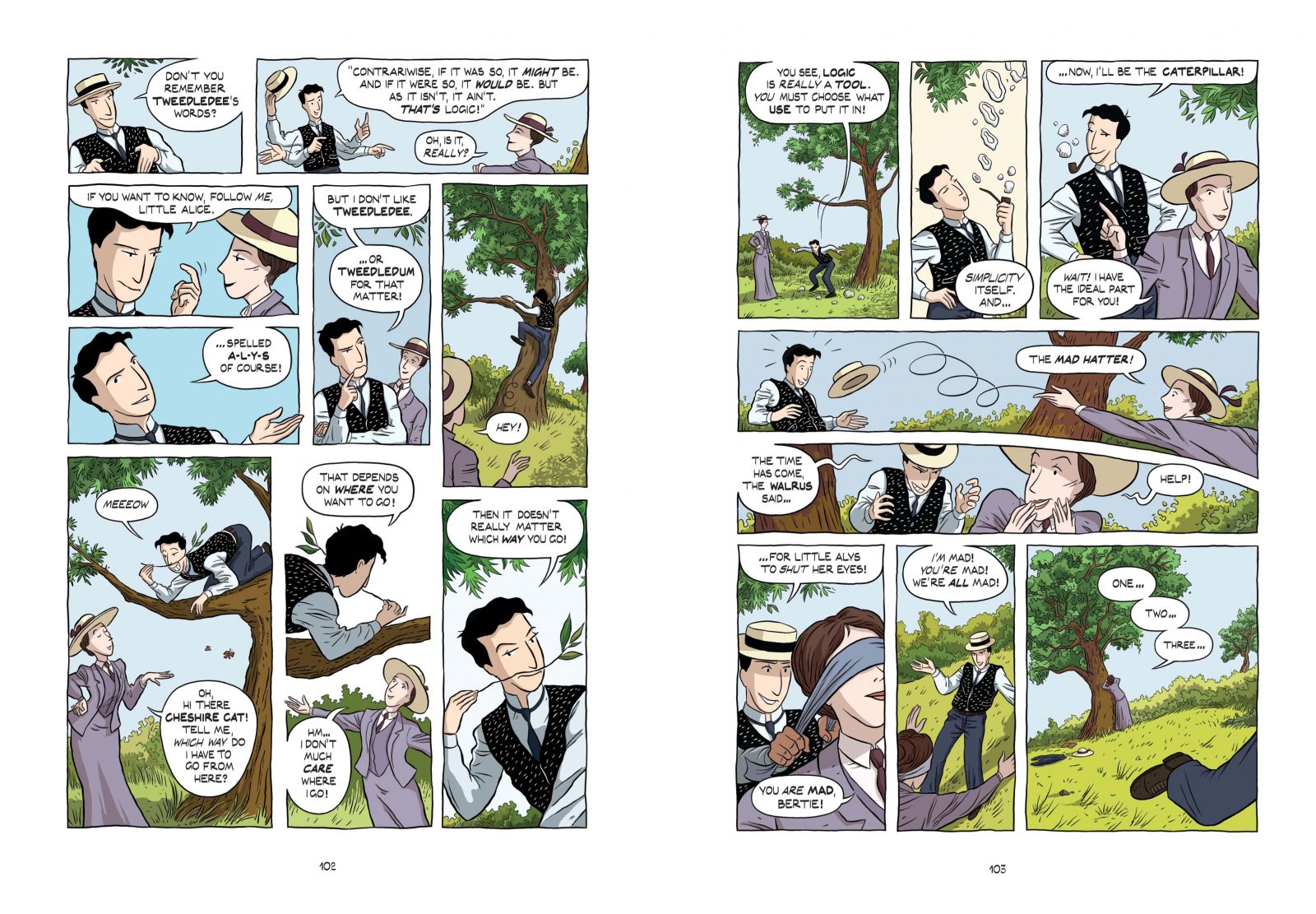Written: Apostolos Doxiadix & Christos H. Papadimitriou
Illustrator: Alecos Papadatos & Annie Di Donna
$22.95 / 352 pages / Full Color
Bloomsbury USA
This comic shouldn’t work, and it shoudn’t work for myriad reasons. The concept itself is dense, layered and intricate. At least it’s in color, if it was in black and white it’d be irrevocably doomed. But don’t let my initially skepticism at this book’s potential deter you, because even though it should be as impossible as the math and logic it represents, the book skillfully walks the line of biography, history text and narrative.
The plot of the book is more or less the life of Bertrand Russell, but it is told in flashback by Russell as he gives a lecture on his life to a group of assembled American students and World War II protestors. The meta-narrative is the authors and artists themselves hashing out the plot and format of the book in modern day Greece. This is paralleled by the comparisons of Russell’s search for truth in the mythic dramas of the ancient Greeks because one of the artists is involved in the performance and the authors themselves cannot help but comment. See what I mean? How do you condense that to an elevator pitch? However, in spite of the seeming difficulty of making a book like this readable, I couldn’t put it down.
The life of Bertrand Russell is an incredible journey of someone who straddled the line between philosopher and mathematician. His story is the Forest Gump of European thinkers of his era as the main plot of the book is his quest to find the fundamental basis for all of mathematics. And that’s where I’m sure most people will stop reading this review, because I used the word “math” for the third time. Which is a shame, because while this is a historically derived tale of literally how what you learned in high school came to be discovered, the creators understand and embrace the humanity of every character they cover. The principle players may never have read comics, but most of these characters are nerds and socially awkward in ways that are totally relatable outside of century and country. When your subject matter are actual humans there’s never a need to contrive drama or foibles, they’re all there in the history just waiting for their stories to be told by a hand deft enough to do so.
I will reemphasize that this is not a book to avoid because it’s about such dry subjects as math, philosophy and logic; if anything this is a primer that will whet the appetite of anyone curious enough to allow themselves to be engaged. The book doesn’t pull intellectual punches but never avoids a simply worded explanation or analogy to keep the reader engaged. At the end of the day this book is about a group of people so wickedly smart they spent their entire lives trying to understand each other’s brilliance, so the authors of this book don’t expect this to be a treatise on what they had to say, rather how their lives informed their work and their humanity. If you liked A Beautiful Mind, Finding Forrester or really any movie about people you know are smarter than you but you still enjoy watching, you’ll like this too.
The art seems simple and flat for a book you know to be about real folks. At first I took little note of it and just continued with the narrative. By the end of the book I was more impressed. My dad is also reading a book on math and we were talking about the things we were learning, he opened his book to a page that described the same events as something in Logicomix and I was able to accurately identify people by photograph when I’d only ever seen them drawn in this comic. I knew then that the art here was something special.
Like any good historical fiction, this book has about 30 pages of text notes at the end, which I usually have a hard time getting through but in this instance devoured. I may not be any better at math, but I can say something about the history of it and rattle off a few named paradoxes to make myself sound smarter (or more boring) at the next party I attend
So the next time you’re feeling tired of the fantastical, pick up this book about the real life intellectual heroes who helped shape our modern world in more ways than you yet realize, learn some things, feel inspired and share the knowledge.
Story: 5 / Art: 4 / Overall: 4.5
(Out of 5)
Grab it at Amazon.
Ryan Haupt thought this book would be boring, it’s a good thing he’s often wrong.




Thanks for the review… I’ve been eyeing this for a while.
Good review, I’m really glad to see this up here. I love the portrayal of Frege and the manic Wittgenstein. Some rather complex ideas, such as Russell’s Paradox, are explained simply and elegantly. A must read for those with an affinity for philosophy and logicism, or simply the intellectually curious.
Thanks Ryan, you hit it right on the head about enjoying something about people smarter than I am. I can barely do math past the 8th grade level but the idea of math has always intrigued me. I know some bare bones facts about Bertrand Russell, so I think this will be an interesting read and am glad that someone smart recommended it!
Logicomix was one of my favorite reads of 2010. In addition to becoming a New York Times bestseller, it won several awards. Here is the book’s website: http://www.logicomix.com.
I loved the book for many of the reasons you mentioned above, but also for its treatment of the seemingly not infrequent concurrence of intellectual genius and mental illness, a fear that haunted Russell most of his life. My only regret was that the book didn’t spend more time on Russell’s pacifism or his notions of liberty (in the English political/philosophical sense)–although those are themes that probably couldn’t have been easily woven into the narrative any more deeply than they were.
Thanks so much for posting this review!
I think I may need to give this another shot… I read it last year and was kind of underwhelmed by it. I’ll have to dig it out of a box, but that shouldn’t be too difficult…
This is a book the term “mixed review” was invented for.
For anyone interested in philosophy, logic, mathematics – it’s an excellent read (and easier to get through than the usual door-stopper brick tomes churned out in this arena).
BUT – as a pure comic, it’s flawed.
In particular, the framing-device within-a-framing device, coupled with the totally self-indulgent insertion of the comic creators into the “story” – routinely takes you out of the flow of the otherwise engrossing events of a remarkable life. One framing device could’ve worked. Two, plus the self-indulgence, nearly lost me.
Like the review above states – it shouldn’t work for a number of reasons – but ultimately, it does. Very good read, despite its all-too-frequent disruptions. Perhaps a stronger editorial influence could’ve taken it to a stellar level. But, it is what it is.
🙂
Prior to reading Logicomix, the only real tangible thing I knew about Bertrand Russell was from a quote said in Shawn of the Dead: “As Bertand Russell once said, ‘The only thing that will redeem mankind is cooperation.’ I think we can all appreciate the relevance of that now”
Encouraged by fellow comic readers, I took part in reading this and was pulled into this historical universe. Ryan talks about the meta-narrative structure and this is what I appreciated most about the reading process of the book. It had a sort of French new-wave element to it, when suddenly our main protagonist is talking directly to you in the camera about the current story at hand; the outet narrative of the writers, artists and friends describing their process and struggle in telling this story provided an unofficial “making of” feature that one would find hand in hand with a movie.
But overall, what I walked away with, Ryan was able to capture into a sentence: “At the end of the day this book is about a group of people so wickedly smart they spent their entire lives trying to understand each other’s brilliance, so the authors of this book don’t expect this to be a treatise on what they had to say, rather how their lives informed their work and their humanity.”
Great write-up, Ryan!